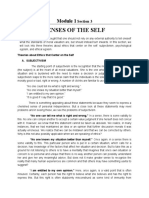Ethical Egoism Word
Ethical Egoism Word
Uploaded by
senoj21Copyright:
Available Formats
Ethical Egoism Word
Ethical Egoism Word
Uploaded by
senoj21Copyright
Available Formats
Share this document
Did you find this document useful?
Is this content inappropriate?
Copyright:
Available Formats
Ethical Egoism Word
Ethical Egoism Word
Uploaded by
senoj21Copyright:
Available Formats
William Jones GAO
Ethical Egoism
A consequentialist approach to morality is one where the outcome of the action is the main factor when deciding upon morality; whereas a deontologist will regard some acts as being flat-out wrong; for example, stealing or killing; and will regard the consequences as of Ethical Egoism states that one should always do the act which will promote the greatest personal good. secondary importance. Thomas Hobbes (1588-1679) says that prior to mankind having a social structure as we would know it there was a state of nature where every individual pursues what benefits him most. he then goes on to say that this is unproductive for the species as a whole as we are competing against one another. Therefore it is better for everyone if we follow rules which institute co-operation between each other; a social contract that will benefit us in the long run because everyone else will not be trying to harm us and instead will benefit us in many cases. This view point; of benefiting society in order to benefit yourself and avoid an anarchic world; is held by enlightened ethical egoist.
Psychological and Ethical Egoism
Psychological egoism is the claim that humans are primarily motivated by self-interest; we are naturally inclined to maximise our own personal advantage. Alternatively an ethical egoist will say that one should do what is best for oneself, we should prioritise our personal goals over other objectives. Yet an ethical egoist would also see that it is better to work together as this will benefit you far more in the long run than acting selfishly; the Prisoners Dilemma is an example of this. Thus the development of society is just as natural as anything else because it too probably arose as a result of evolution, future generations would benefit from an altruistic way of life as there were more offspring.
Kants Universalizability Principle
While an ethical egoist decides to help the community because he reasons that the consequences of his action will benefit him in the future; on the other hand Kant reasons that as we are all rational beings that any rational decision to apply to all of us in the same way. Following this, his principle states that we must see if we can universalize a moral law before saying it is a moral imperative. He is not asking if in any situation if the consequences of the act are good; only if the action can be pragmatically applied to everyone throughout the many circumstances in which it would come up; can everyone was to live by that ethical law.
Evaluation
Opposition: There is an assumption made by the egoist to move from the pyschological point that we are all selfish by nature to the fact that we have a moral duty to act in our own self-interests. Rebuttal: This might not be the argument of the egoist however, he may be saying that as we are all selfish by nature it would be foolish to propose that we would do anything but act in our own self-interest.
William Jones GAO
Opposition: Yet surely we do care for others as well; the examples of family being one. Parents will raise the children although this brings them no apparent benefit. A charity worker behaves very altruistically and yet the egoist would maintain that this is an act in ones own interest. Rebuttal: The egoist replies that we only do these actions in order to satisfy our own egos; we only give to charity so we can believe that we arent misers, we raise children so we can have the joy of watching them grow up and caring for them. Opposition: Yet the egoist is unable to prove that we give to charity only to flatter our egos or that we simply feel good only for having done a good thing. This mainly trips up the psychological egoist whose main problem also lies in the fact that then every act is a selfish act because it is done solely for ones own interest. Another cunning weakness in this theory is that if you had to give advice or tell someone what to do then you would have to tell them to do whatever would benefit you and not the person asking you. Rebuttal: Although there is no distinct answer to the latter problem it could be that this is the exception to the rule and that the best thing to do would be to tell that person to behave in the way an egoist would behave because this would benefit society more and therefore the benefit of his actions should affect the advice giver as well; alternatively it is possible to say that if advice was given where he would do what is best for the advice-giver that this would in the long run be bad for the advice giver who would have to face trouble from others for manipulating people, ie a boss at work or a parental figure.
You might also like
- Metaethics, Normative Ethics, and Applied EthicsDocument6 pagesMetaethics, Normative Ethics, and Applied EthicsTyler Lee100% (2)
- 7 - Consequentialism & UtilitarianismDocument26 pages7 - Consequentialism & Utilitarianismfr09n100% (1)
- Lesson 3Document5 pagesLesson 3CJ Ibale100% (4)
- Utilitarianism Trolley ProblemDocument4 pagesUtilitarianism Trolley ProblemaiveNo ratings yet
- 10major Theories in Normative EthicsDocument5 pages10major Theories in Normative EthicsMargaux Anne BarbinNo ratings yet
- Prof - Ethicsandcomm.eng AssignmentDocument4 pagesProf - Ethicsandcomm.eng Assignmentmaryumzia14No ratings yet
- 5 ConsequentialistDocument24 pages5 ConsequentialistUtkarsh PrasadNo ratings yet
- Maryam Bibi Ethics Assignment 2Document7 pagesMaryam Bibi Ethics Assignment 2maryumzia14No ratings yet
- Phil 235 Notes For All UnitsDocument26 pagesPhil 235 Notes For All UnitsarianabonarrigoNo ratings yet
- Ethical Behavior in Accounting: Ethical TheoryDocument17 pagesEthical Behavior in Accounting: Ethical TheoryViola JovitaNo ratings yet
- Ethical Theories SummaryDocument9 pagesEthical Theories SummaryPaul Yatim100% (1)
- MODULE 5: Ethical Framework: Utilitarianism/ConsequentialismDocument8 pagesMODULE 5: Ethical Framework: Utilitarianism/ConsequentialismArjim TagnipisNo ratings yet
- Ethics (Ethical Egoism, Psychological Egoism and Social Contract Theory) ReviewerDocument6 pagesEthics (Ethical Egoism, Psychological Egoism and Social Contract Theory) Reviewerroyce542No ratings yet
- Towards The Ethical RobotDocument13 pagesTowards The Ethical RobotDanteA100% (1)
- applied ethicsDocument6 pagesapplied ethicsebise9857No ratings yet
- 4.3. Immanuel Kant and Right TheoryDocument6 pages4.3. Immanuel Kant and Right TheorysuguitancharlynpanchoNo ratings yet
- Ethical Principles SynthesisDocument4 pagesEthical Principles SynthesisjenNo ratings yet
- PHIL1034_Midterm QuestionsDocument7 pagesPHIL1034_Midterm QuestionsAmberNo ratings yet
- GEC7 Chap 4 Topic 3Document8 pagesGEC7 Chap 4 Topic 3mikotaktNo ratings yet
- M2L1 BioethicsDocument3 pagesM2L1 BioethicsCal PadullonNo ratings yet
- Topic 2 - Normative Theories of Ethics (Week 3)Document19 pagesTopic 2 - Normative Theories of Ethics (Week 3)Pei JuanNo ratings yet
- Ethical Egoism Is The View That Each of Us Ought To Pursue Our Own Self-Interest, and No-One Has AnyDocument2 pagesEthical Egoism Is The View That Each of Us Ought To Pursue Our Own Self-Interest, and No-One Has AnySami Liam TamayoNo ratings yet
- Thical Egoism: Is There A Duty To Help The Starving?Document6 pagesThical Egoism: Is There A Duty To Help The Starving?Mark BrosotoNo ratings yet
- Module Content Topic 7: Immanuel Kant and Right Theory Nominal Duration: 4.5 Hours Learning OutcomesDocument7 pagesModule Content Topic 7: Immanuel Kant and Right Theory Nominal Duration: 4.5 Hours Learning OutcomesRhonel Alicum GaluteraNo ratings yet
- 5 Lesson EthicsDocument6 pages5 Lesson Ethicschroma warframeNo ratings yet
- Chapter 9: Consequentialism (Its Nature and Attractions)Document32 pagesChapter 9: Consequentialism (Its Nature and Attractions)Vũ Hồng NgọcNo ratings yet
- Criticisms of UtilitarianismDocument4 pagesCriticisms of UtilitarianismMuhammad MujahidNo ratings yet
- Module 5 - AnnotatedDocument6 pagesModule 5 - AnnotatedGD WestNo ratings yet
- Chapter TwoDocument30 pagesChapter Twomulusewamare19No ratings yet
- EGOISM and ALTRUISMDocument4 pagesEGOISM and ALTRUISMfredelito mazoNo ratings yet
- Unit I. Theories and Principles of Health EthicsDocument6 pagesUnit I. Theories and Principles of Health EthicsShane PangilinanNo ratings yet
- Ethics ConsequentialismDocument19 pagesEthics ConsequentialismJibfrho SagarioNo ratings yet
- Thesis StatementDocument4 pagesThesis StatementAlmeogene PahuyoNo ratings yet
- Hi Guys Its Done Hahahahah121Document6 pagesHi Guys Its Done Hahahahah121Jose Mariano MelendezNo ratings yet
- Distinction Between Bentham and Mill's Version of UtilitarianismDocument5 pagesDistinction Between Bentham and Mill's Version of UtilitarianismSteffNo ratings yet
- Ethical Egoism Guided Study Pro and ConDocument5 pagesEthical Egoism Guided Study Pro and ConKjguezilleNo ratings yet
- Course OutlineDocument62 pagesCourse OutlinemasorNo ratings yet
- Freedom AsFoundation For Moral Acts and Reasons and ImpartialityDocument3 pagesFreedom AsFoundation For Moral Acts and Reasons and ImpartialityEms TeopeNo ratings yet
- Tredtwo 2Document16 pagesTredtwo 2Mika ArevaloNo ratings yet
- Ethics Reviewer 2Document6 pagesEthics Reviewer 2andreagabriellecuiNo ratings yet
- 04 Ethics Lecture 04+05+6Document72 pages04 Ethics Lecture 04+05+6Faika Nawar NoorNo ratings yet
- Written Report Ethical Theories and PerspectivesDocument6 pagesWritten Report Ethical Theories and PerspectivesnonononowayNo ratings yet
- IwiwiwwDocument8 pagesIwiwiwwGracell SangoNo ratings yet
- Ethical Issues in Accounting: Course Code: ACT 4102Document19 pagesEthical Issues in Accounting: Course Code: ACT 4102Tanvir AhmedNo ratings yet
- Introduction of ethics (1)Document5 pagesIntroduction of ethics (1)aatiqafarooq478No ratings yet
- Immanuel Kant and Right TheoryDocument7 pagesImmanuel Kant and Right TheoryAndrea LopezNo ratings yet
- GEC 7 Chapter 4 Topic 3 Immanuel Kant and Right TheoryDocument7 pagesGEC 7 Chapter 4 Topic 3 Immanuel Kant and Right TheoryDaniela Nicole Manibog ValentinoNo ratings yet
- Chapter TwoDocument20 pagesChapter TwokasimNo ratings yet
- A Summary of John FinnisDocument5 pagesA Summary of John FinnisSHASHANK SHEKHARNo ratings yet
- Utilitarianism Ethical TheoryDocument12 pagesUtilitarianism Ethical TheorynimusiimaessieNo ratings yet
- GE EthicsDocument4 pagesGE Ethicsjoan arreolaNo ratings yet
- Ethics SW5Document24 pagesEthics SW5Claude CaduceusNo ratings yet
- ETHICSDocument4 pagesETHICSJoycee BurtanogNo ratings yet
- Ethics-1 6Document2 pagesEthics-1 6Johnny King ReyesNo ratings yet
- Running Head. Motivational UtilitarianDocument7 pagesRunning Head. Motivational UtilitarianJohnNo ratings yet
- m1 - 3rd Topic Senses of The SelfDocument4 pagesm1 - 3rd Topic Senses of The SelfKobe Marco VolanteNo ratings yet
- B Ethics Module IIDocument9 pagesB Ethics Module IIAnil B MalaliNo ratings yet
- Moral Theories As Frames of Moral Experiences: Issaiah Nicolle L. Cecilia 1 NRS - 1Document4 pagesMoral Theories As Frames of Moral Experiences: Issaiah Nicolle L. Cecilia 1 NRS - 1Issaiah Nicolle CeciliaNo ratings yet
- Feminism and Ibsen's A Doll's HouseDocument7 pagesFeminism and Ibsen's A Doll's HouseSamy Ismail100% (1)
- Narrative Caroline Ramsey 2005Document17 pagesNarrative Caroline Ramsey 2005Stephen NorrisNo ratings yet
- Module 2: Lesson 2: Name: Crs/yr/SecDocument6 pagesModule 2: Lesson 2: Name: Crs/yr/SecJa-Cy R4o15se04ro100% (1)
- Anitha KotturDocument11 pagesAnitha KotturAnithamol BabuNo ratings yet
- XCVXCVDocument2 pagesXCVXCVHari KrishnanNo ratings yet
- K Kerja-C01Document5 pagesK Kerja-C01EllyYana100% (1)
- Roman Portraits in The Getty MuseumDocument145 pagesRoman Portraits in The Getty Museumekoya100% (3)
- Mental HealthDocument58 pagesMental HealthKshitij MauryaNo ratings yet
- Zaki Diss Article 1Document15 pagesZaki Diss Article 1Amos Adukson100% (1)
- Translating PoetryDocument18 pagesTranslating PoetryLaura MarieNo ratings yet
- Japan Travel BrochureDocument2 pagesJapan Travel BrochureMikail Lee BelloNo ratings yet
- Hypertext Was Born Around 1200 - A Historical Perspective On Textual Navigation - Herve PlatteauxDocument20 pagesHypertext Was Born Around 1200 - A Historical Perspective On Textual Navigation - Herve PlatteauxsrdiegoNo ratings yet
- Teaching and Learning Materials For ESL ClassroomDocument13 pagesTeaching and Learning Materials For ESL ClassroomAdie AbdullahNo ratings yet
- Bullos - GED125 (Culturally Sensitive and Bias Free Language)Document1 pageBullos - GED125 (Culturally Sensitive and Bias Free Language)Lyza Mae BullosNo ratings yet
- Final Lindseytexeira-Who Am I As An ArtistDocument8 pagesFinal Lindseytexeira-Who Am I As An Artistapi-282613412No ratings yet
- Literature ReviewDocument7 pagesLiterature ReviewGari Vi Lao100% (1)
- ACTIVITY DESIGN-WPS OfficeDocument3 pagesACTIVITY DESIGN-WPS OfficeAldrin ZolinaNo ratings yet
- Beginner Unit 8aDocument2 pagesBeginner Unit 8apersiano1030% (1)
- Asian Civilization: Prof. Bob Jimenez, PTRP, MBA-HRMDocument24 pagesAsian Civilization: Prof. Bob Jimenez, PTRP, MBA-HRMShein BernardoNo ratings yet
- Preparing Students For Future TechnologyDocument3 pagesPreparing Students For Future TechnologyEll Cabras100% (1)
- Intro To Media LiteracyDocument16 pagesIntro To Media Literacyapi-243228236No ratings yet
- Nietzsche: Philosopher, Psychologist, Antichrist: German Friedrich Nietzsche Walter KaufmannDocument1 pageNietzsche: Philosopher, Psychologist, Antichrist: German Friedrich Nietzsche Walter KaufmannHussam0% (1)
- Test Bank For Organizational Behavior: An Experiential Approach, 8/E 8th Edition Joyce S Osland, David A. Kolb, Irwin M Rubin, Marlene E. TurnerDocument34 pagesTest Bank For Organizational Behavior: An Experiential Approach, 8/E 8th Edition Joyce S Osland, David A. Kolb, Irwin M Rubin, Marlene E. Turnerdoclotkehus100% (11)
- Special Education 33 UntsDocument2 pagesSpecial Education 33 UntsMark Ian JoaquinNo ratings yet
- Arquivo: Boletim Do Arquivo Histórico de Moçambique, 1987-1997Document42 pagesArquivo: Boletim Do Arquivo Histórico de Moçambique, 1987-1997Victor LoforteNo ratings yet
- George Grant Philosophy in The Mass AgeDocument140 pagesGeorge Grant Philosophy in The Mass AgeJim MorinNo ratings yet
- Dr. Ayush Srivastava Dr. A. P. J. Abdul Kalam Technical University Assistant Registrar Uttar Pradesh, Lucknow Nodal Officer-Training & PlacementDocument3 pagesDr. Ayush Srivastava Dr. A. P. J. Abdul Kalam Technical University Assistant Registrar Uttar Pradesh, Lucknow Nodal Officer-Training & PlacementNaman MishraNo ratings yet
- Duties and Responsibilities of The Nursing PersonnelDocument54 pagesDuties and Responsibilities of The Nursing PersonnelMercyNo ratings yet
- DLL - Oral CommunicationDocument3 pagesDLL - Oral CommunicationXianPaulette Mingi Manalaysay100% (1)
- Audio VisualsDocument23 pagesAudio VisualsKaren Bersoto De GuzmanNo ratings yet

























































































